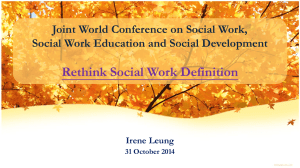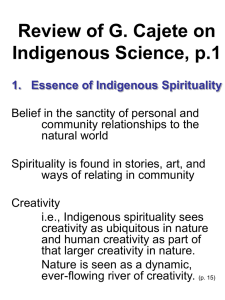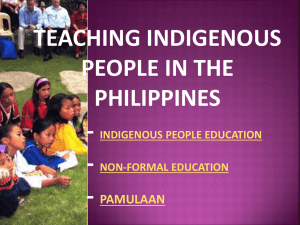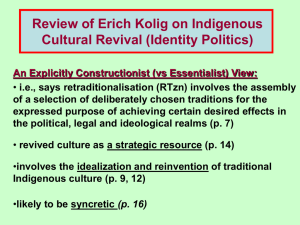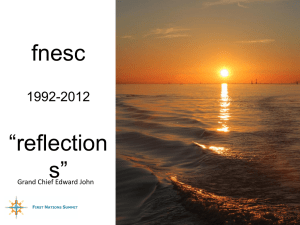English Power Point
advertisement
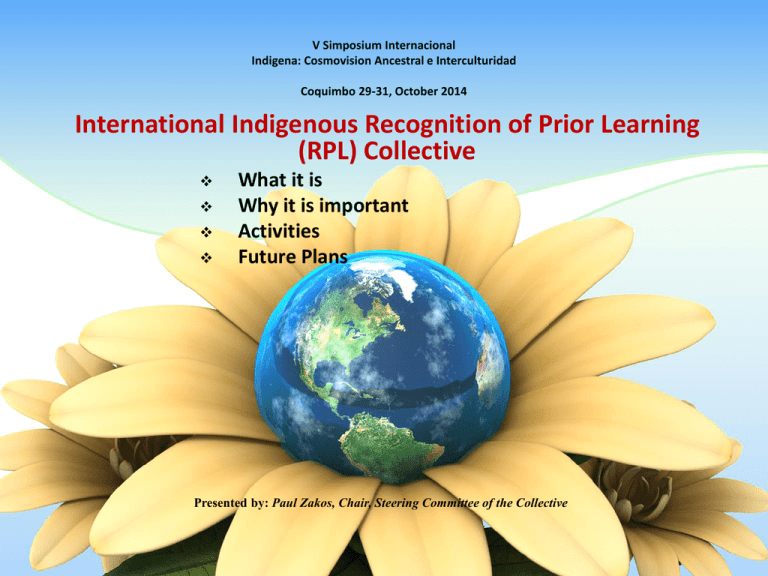
V Simposium Internacional Indigena: Cosmovision Ancestral e Interculturidad Coquimbo 29-31, October 2014 International Indigenous Recognition of Prior Learning (RPL) Collective What it is Why it is important Activities Future Plans Presented by: Paul Zakos, Chair, Steering Committee of the Collective 1 RECOGNITION OF PRIOR LEARNING (RPL) Recognition of Prior Learning or RPL is a process that involves the identification, documentation, assessment and recognition of learning acquired through both formal and informal study. This may include work and life experiences, training, independent study, volunteering, travel, hobbies, community, family and cultural experiences. The recognition of prior learning can be used toward the requirements of an academic or training program, occupational/professional certification, employment/labour market entry, personal and cultural development. 2 INTERNATIONAL INDIGENOUS RECOGNITION OF PRIOR LEARNING (RPL) COLLECTIVE In 2009 in Canada a steering committee comprises of representatives from Chile, Ecuador, South Africa and Nunavut was formed to explore the development of an International Indigenous Recognition of Prior Learning Collective. Members included Jennifer Archer, Program Manager, Nunavut Arctic college; Maria Hueichaqueo and Pedro Valenzuela, Directors of Tain Adkimn, Chile; Luis Maldonado, Director, School of Indigenous Governance Quito, Ecuador; Diane Hill, Carlos Sebastian and Paul Zakos, First Nations Technical Institute, Ontario; Nqabomzi Gawe, Vice Chancellor, Durban University of Technology, South Africa and Kessie Moodley, Director, Workers’ College, South Africa. 3 FOUNDING PRINCIPLES Foundation for the work of the Collective is United Nations Declaration on Rights of Indigenous Peoples, Articles 13 & 14. MEMBERS OF STEERING COMMITTEE FOR COLLECTIVE Pedro Valenzuela, Maria Hueichaqueo, Chile, Kessie Moodley, South Africa, Jennifer Archer, Nunavut Sharon Hobenshield, Janet Sinclair, Banakonda Kennedy Kish, Heather Green, Glen Brouwer, Canada 4 UNITED NATIONS DECLARATION ON THE RIGHTS OF INDIGENOUS PEOPLES Article 13 Indigenous peoples have the right to revitalize, use, develop and transmit to future generations their histories, languages, oral traditions, philosophies, writing systems and literatures and to designate and retain their own names for communities, places and persons… States shall take effective measures to ensure that this right is protected. Article 14 Indigenous peoples have the right to establish and control their educational systems and institutions providing education in their own languages, in a manner appropriate to their cultural methods of teaching and learning… States shall in conjunction with Indigenous peoples, take effective measures, in order for Indigenous individuals to an education in their own culture and provided in their own language. 5 2009 – 2014 Steering committee developed a vision and mission statement of objectives for Collective. 6 VISION The International Indigenous RPL Collective recognizes values and gives vision (voice) and legitimacy to Indigenous languages, cultures and ways of knowing. It is inclusive, reflecting the needs, values and wishes of diverse peoples. It nurtures and strengthens their desire to assume their rightful places as full partners in the societies in which they live. The Collective believes that culturally respectful approaches to learning enable Indigenous peoples to make informed choices related to improving their quality of life, standard of living and taking charge of their own destiny. 7 MISSION Working toward the creation of Indigenous controlled institutions of higher learning, the Collective aims to influence key policy decisions related to education and learning initiatives of governments and educational systems. It advocates for formal recognition of Indigenous ways of knowing which support and respect traditional knowledge, strengthen language, culture and self-determination. It works co-operatively with its members and key stakeholders, from public and private sector, to create institutions and practices which respect the validity and credibility of Indigenous knowledge, cultural teachings and languages. Standards and methods of assessment are developed and articulated by recognizing knowledge keepers from within the Collective. 8 OBJECTIVES The International Indigenous RPLC promotes culturally-based recognition of prior learning and adult learning practices which: 1. enhance, safeguard and validate Indigenous languages, cultures and ways of knowing. 2. identify community strengths, resources, needs. 3. support collaborative approaches enabling collective consciousness-raising and social action 4. strengthen self-confidence, self-reliance and community capacity for selfdetermination. 9 5. promote Indigenous nations and groups as full partners in educational policy, planning, delivery and evaluation. 6. create international Indigenous benchmarks of best practice for RPL within an integrated framework of culturally respectful adult learning principles, practices. 7. support co-operative approaches to culturally-based wholistic learning. 8. disseminate best practices and discover new practices. 9. host regular gatherings of members and other interested stakeholder groups, organizations and individuals. 10 STRENGTHS OF THE INTERNATIONAL INDIGENOUS RPL COLLECTIVE The Collective promotes: 1. Respect for and reverence of all living things, as acknowledged by Indigenous values, practices and ways of knowing. 2. Support and recognition needed to validate worldwide recognition of prior learning based on the experiences of diverse indigenous communities. 3. Development of a wider base of skills, knowledge and learning options for Indigenous people. 4. Strategies and resources to influence Indigenous education policy at a national and international level, based on institutional experiences and successes of RPL. 5. Opportunities to link like-minded practitioners from around the world to give encouragement and strength to all members of the Collective. 11 ACCOMPLISHMENTS AND ACTIONS A. ACCOMPLISHMENTS 1. Creation of a website (http://www.theindigenouscollective.org) • Introduce vision, mission, objectives of Collective • Information about its work • Reaching out to all Indigenous cultures • Reducing barriers, increasing supports for culturally-based, respectful educational programs • 5th Annual International Symposium: Conocimiento Ancestral e Interculturalidad, Coquimbo, 2014 2. Developed draft institutional self-evaluation tool for use by educational institutions, governments to ensure programs, courses are based on Indigenous cultures and languages. 12 B. ACTIONS 1. Future Activities • Identify sources of funding to sustain and strengthen Collective. 2. Membership • Criteria, reach out to Indigenous individuals, groups, organizations who support the vision, mission of Collective and invite their participation, collaboration. 3. Establish an Annual Conference • Record, celebrate and share successes. • Renew commitment to Indigenous knowledge, recognition of prior learning, adult learning, social justice and social change. 13 CLOSING SUMMARY Questions, Comments 14

